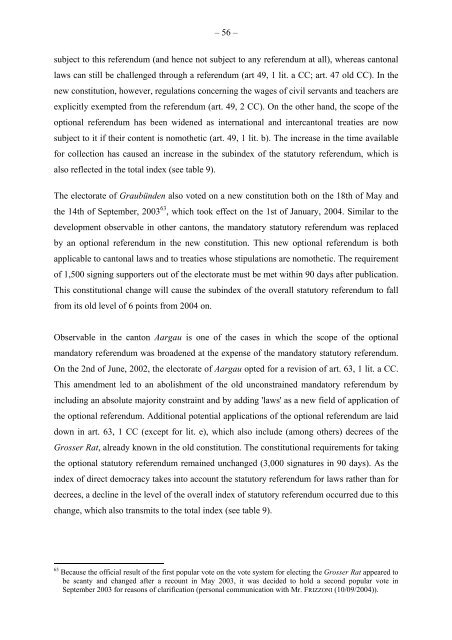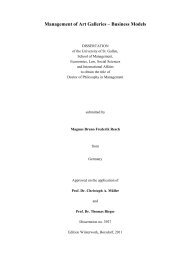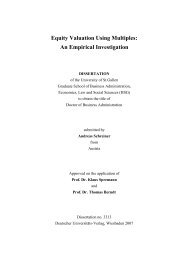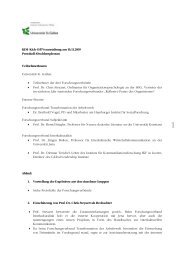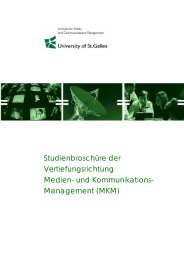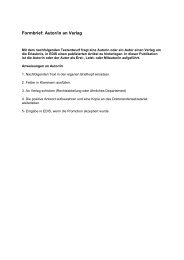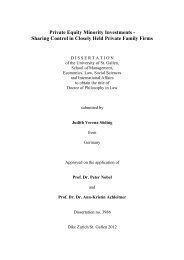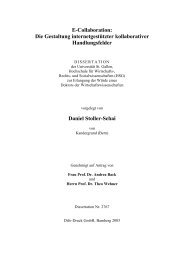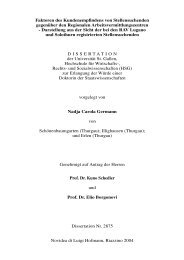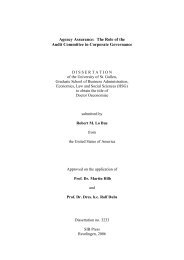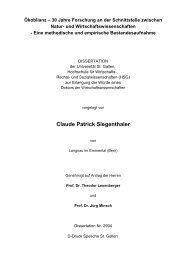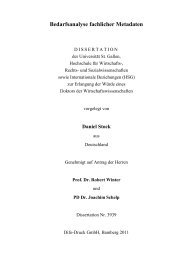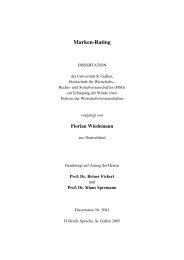The Impact of Direct Democracy on Society - Universität St.Gallen
The Impact of Direct Democracy on Society - Universität St.Gallen
The Impact of Direct Democracy on Society - Universität St.Gallen
- No tags were found...
Create successful ePaper yourself
Turn your PDF publications into a flip-book with our unique Google optimized e-Paper software.
– 56 –subject to this referendum (and hence not subject to any referendum at all), whereas cant<strong>on</strong>allaws can still be challenged through a referendum (art 49, 1 lit. a CC; art. 47 old CC). In thenew c<strong>on</strong>stituti<strong>on</strong>, however, regulati<strong>on</strong>s c<strong>on</strong>cerning the wages <str<strong>on</strong>g>of</str<strong>on</strong>g> civil servants and teachers areexplicitly exempted from the referendum (art. 49, 2 CC). On the other hand, the scope <str<strong>on</strong>g>of</str<strong>on</strong>g> theopti<strong>on</strong>al referendum has been widened as internati<strong>on</strong>al and intercant<strong>on</strong>al treaties are nowsubject to it if their c<strong>on</strong>tent is nomothetic (art. 49, 1 lit. b). <str<strong>on</strong>g>The</str<strong>on</strong>g> increase in the time availablefor collecti<strong>on</strong> has caused an increase in the subindex <str<strong>on</strong>g>of</str<strong>on</strong>g> the statutory referendum, which isalso reflected in the total index (see table 9).<str<strong>on</strong>g>The</str<strong>on</strong>g> electorate <str<strong>on</strong>g>of</str<strong>on</strong>g> Graubünden also voted <strong>on</strong> a new c<strong>on</strong>stituti<strong>on</strong> both <strong>on</strong> the 18th <str<strong>on</strong>g>of</str<strong>on</strong>g> May andthe 14th <str<strong>on</strong>g>of</str<strong>on</strong>g> September, 2003 63 , which took effect <strong>on</strong> the 1st <str<strong>on</strong>g>of</str<strong>on</strong>g> January, 2004. Similar to thedevelopment observable in other cant<strong>on</strong>s, the mandatory statutory referendum was replacedby an opti<strong>on</strong>al referendum in the new c<strong>on</strong>stituti<strong>on</strong>. This new opti<strong>on</strong>al referendum is bothapplicable to cant<strong>on</strong>al laws and to treaties whose stipulati<strong>on</strong>s are nomothetic. <str<strong>on</strong>g>The</str<strong>on</strong>g> requirement<str<strong>on</strong>g>of</str<strong>on</strong>g> 1,500 signing supporters out <str<strong>on</strong>g>of</str<strong>on</strong>g> the electorate must be met within 90 days after publicati<strong>on</strong>.This c<strong>on</strong>stituti<strong>on</strong>al change will cause the subindex <str<strong>on</strong>g>of</str<strong>on</strong>g> the overall statutory referendum to fallfrom its old level <str<strong>on</strong>g>of</str<strong>on</strong>g> 6 points from 2004 <strong>on</strong>.Observable in the cant<strong>on</strong> Aargau is <strong>on</strong>e <str<strong>on</strong>g>of</str<strong>on</strong>g> the cases in which the scope <str<strong>on</strong>g>of</str<strong>on</strong>g> the opti<strong>on</strong>almandatory referendum was broadened at the expense <str<strong>on</strong>g>of</str<strong>on</strong>g> the mandatory statutory referendum.On the 2nd <str<strong>on</strong>g>of</str<strong>on</strong>g> June, 2002, the electorate <str<strong>on</strong>g>of</str<strong>on</strong>g> Aargau opted for a revisi<strong>on</strong> <str<strong>on</strong>g>of</str<strong>on</strong>g> art. 63, 1 lit. a CC.This amendment led to an abolishment <str<strong>on</strong>g>of</str<strong>on</strong>g> the old unc<strong>on</strong>strained mandatory referendum byincluding an absolute majority c<strong>on</strong>straint and by adding 'laws' as a new field <str<strong>on</strong>g>of</str<strong>on</strong>g> applicati<strong>on</strong> <str<strong>on</strong>g>of</str<strong>on</strong>g>the opti<strong>on</strong>al referendum. Additi<strong>on</strong>al potential applicati<strong>on</strong>s <str<strong>on</strong>g>of</str<strong>on</strong>g> the opti<strong>on</strong>al referendum are laiddown in art. 63, 1 CC (except for lit. e), which also include (am<strong>on</strong>g others) decrees <str<strong>on</strong>g>of</str<strong>on</strong>g> theGrosser Rat, already known in the old c<strong>on</strong>stituti<strong>on</strong>. <str<strong>on</strong>g>The</str<strong>on</strong>g> c<strong>on</strong>stituti<strong>on</strong>al requirements for takingthe opti<strong>on</strong>al statutory referendum remained unchanged (3,000 signatures in 90 days). As theindex <str<strong>on</strong>g>of</str<strong>on</strong>g> direct democracy takes into account the statutory referendum for laws rather than fordecrees, a decline in the level <str<strong>on</strong>g>of</str<strong>on</strong>g> the overall index <str<strong>on</strong>g>of</str<strong>on</strong>g> statutory referendum occurred due to thischange, which also transmits to the total index (see table 9).63 Because the <str<strong>on</strong>g>of</str<strong>on</strong>g>ficial result <str<strong>on</strong>g>of</str<strong>on</strong>g> the first popular vote <strong>on</strong> the vote system for electing the Grosser Rat appeared tobe scanty and changed after a recount in May 2003, it was decided to hold a sec<strong>on</strong>d popular vote inSeptember 2003 for reas<strong>on</strong>s <str<strong>on</strong>g>of</str<strong>on</strong>g> clarificati<strong>on</strong> (pers<strong>on</strong>al communicati<strong>on</strong> with Mr. FRIZZONI (10/09/2004)).


